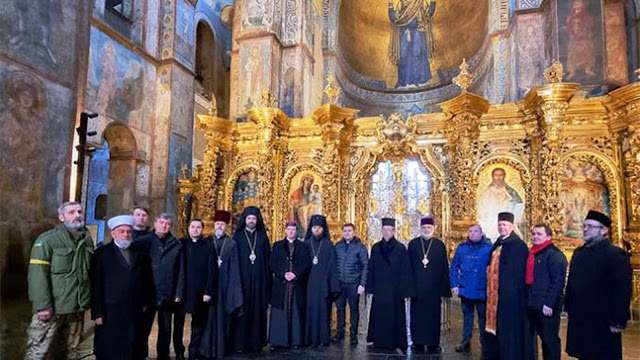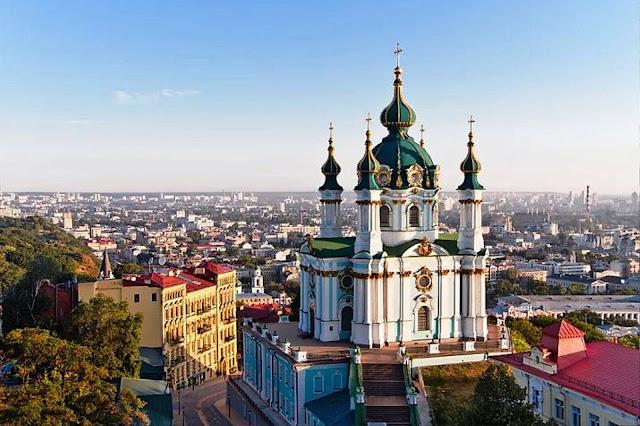Introduction
Ukraine, a country located at the crossroads of Europe and Asia, has a diverse and rich cultural heritage shaped by its history and geographical location. Over the centuries, various religious beliefs have taken root in this land, creating a tapestry of faiths and traditions that continue to influence Ukrainian society to this day. In this article, we delve into the religious composition of Ukraine, exploring the major religious groups and the significance of their presence in shaping the country's identity.
Eastern Orthodox Christianity: The Pillar of Ukrainian Faith
Eastern Orthodox Christianity stands as the dominant religious affiliation in Ukraine, deeply ingrained in the country's history, culture, and identity. The majority of Ukrainians identify as Orthodox Christians, and there are three primary Orthodox churches in the region: the Ukrainian Orthodox Church - Kyiv Patriarchate, the Ukrainian Orthodox Church - Moscow Patriarchate, and the Ukrainian Autocephalous Orthodox Church.
The Ukrainian Orthodox Church - Kyiv Patriarchate emerged as a significant religious institution after the fall of the Soviet Union in 1991. It embraces Ukrainian nationalism and seeks independence from the Russian Orthodox Church, which has sometimes sparked tensions between the two. The Ukrainian Orthodox Church - Moscow Patriarchate, on the other hand, maintains its allegiance to the Russian Orthodox Church and is more conservative in its theological stance.
Ukrainian Autocephalous Orthodox Church represents another branch of Ukrainian Orthodoxy, advocating for autonomy and independence from both the Russian and Kyiv Patriarchates. Though it has a smaller following compared to the other two branches, it plays a crucial role in promoting the notion of an independent Ukrainian identity within the Orthodox Christian framework.
Catholicism: Western Influences in Ukraine
In addition to Eastern Orthodoxy, Ukraine is home to a significant Roman Catholic community, particularly in the western regions of the country. The roots of Catholicism in Ukraine date back to the medieval period when the western territories were under the influence of the Polish-Lithuanian Commonwealth. The Union of Brest in 1596 further solidified the presence of the Ukrainian Greek Catholic Church, also known as the Uniate Church.
The Ukrainian Greek Catholic Church is a unique religious entity, combining Eastern Christian liturgical traditions with loyalty to the Pope in Rome. It played an essential role in preserving Ukrainian identity and culture during times of political and religious suppression. Despite some historical challenges, the Ukrainian Greek Catholic Church remains a vibrant and influential religious community, particularly in Western Ukraine.
Protestantism: The Rise of Evangelical Faiths
Over the past few centuries, Ukraine has witnessed the growth of Protestant Christianity, with various denominations gaining prominence. Baptist churches are among the most significant Protestant communities, with a strong following in different parts of the country. Their emphasis on personal faith, adult baptism, and scriptural authority appeals to many Ukrainians seeking a more individualized religious experience.
Pentecostalism has also gained considerable traction in Ukraine, drawing in believers with its emphasis on spiritual gifts, including speaking in tongues and divine healing. The charismatic nature of Pentecostalism resonates with many Ukrainians, leading to the establishment of numerous Pentecostal congregations across the country.
Adventists, Methodists, and other Protestant denominations also contribute to the religious diversity of Ukraine, offering alternative spiritual paths to those seeking different expressions of Christian faith.
Judaism: A Rich but Diminished Legacy
Historically, Ukraine was home to a vibrant and flourishing Jewish community, with deep roots dating back to ancient times. Jewish culture and traditions significantly influenced Ukrainian society, particularly in areas such as arts, literature, and commerce. However, the Holocaust during World War II and subsequent emigration resulted in a drastic decline in the Jewish population.
Today, the Jewish community in Ukraine remains relatively small but holds a significant place in the nation's history and collective memory. Efforts to preserve Jewish heritage and culture continue through the existence of synagogues, cultural centers, and educational initiatives.
Islam: The Minority Faiths in Ukraine
Ukraine's Muslim population is relatively modest, with the majority concentrated in Crimea and certain regions of Southern Ukraine. The Crimean Tatars, descendants of Turkic-speaking peoples, comprise the largest Muslim community in the country. They played a vital role in shaping Crimea's history and culture, adding unique elements to Ukraine's religious landscape.
Aside from the Crimean Tatars, there are smaller Muslim communities in mainland Ukraine, including those with Central Asian, Caucasian, and Middle Eastern backgrounds. The Islamic community in Ukraine embraces various traditions and practices, reflecting the diversity of its members' cultural backgrounds.
Other Religions and Non-Religious Affiliations
In addition to the major religious groups mentioned above, Ukraine is also home to various smaller religious communities, such as Greek Catholics, Jews, Buddhists, and adherents of other faiths. These communities contribute to the country's religious diversity and demonstrate the acceptance of different beliefs within Ukrainian society.
Moreover, a portion of the population identifies as atheists or non-religious. Ukraine's history of atheism under Soviet rule, coupled with the modern secularization trend, has led to an increase in the number of individuals who do not associate with any particular religious group.
Conclusion
Ukraine's religious landscape is an intricate mosaic of beliefs and traditions, shaped by a rich historical tapestry that reflects its multi-ethnic and multi-cultural heritage. While Eastern Orthodox Christianity remains the predominant faith, other religious groups, such as Catholics, Protestants, Jews, Muslims, and adherents of various faiths, all contribute to the diversity and vibrancy of Ukrainian society.
Throughout its history, Ukraine has navigated the complexities of religious pluralism, accommodating different beliefs and preserving cultural identities. This coexistence is a testament to the resilience of the Ukrainian people, fostering a shared understanding and appreciation of their religious heritage as they continue to shape their nation's future.







No comments:
Post a Comment